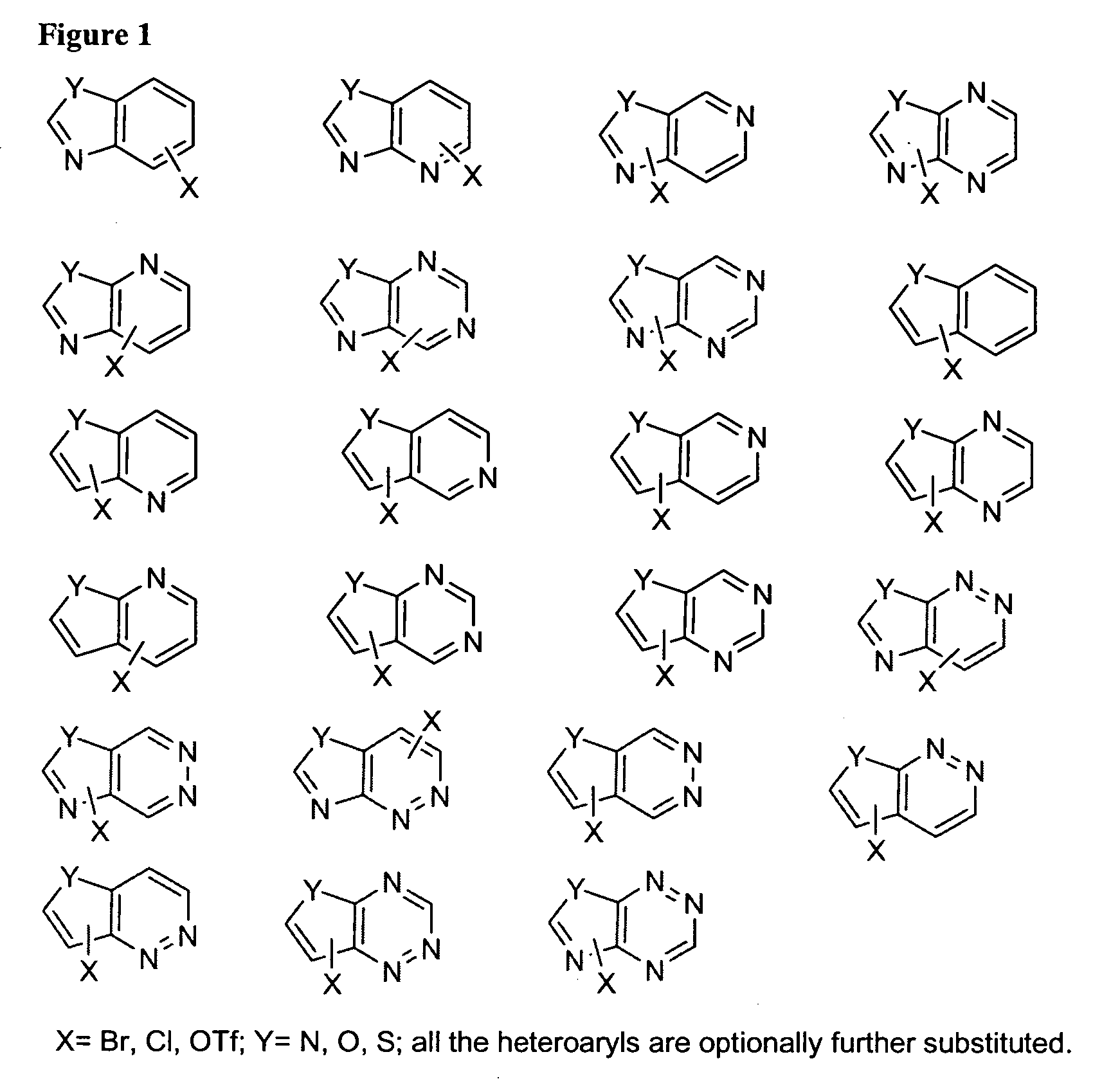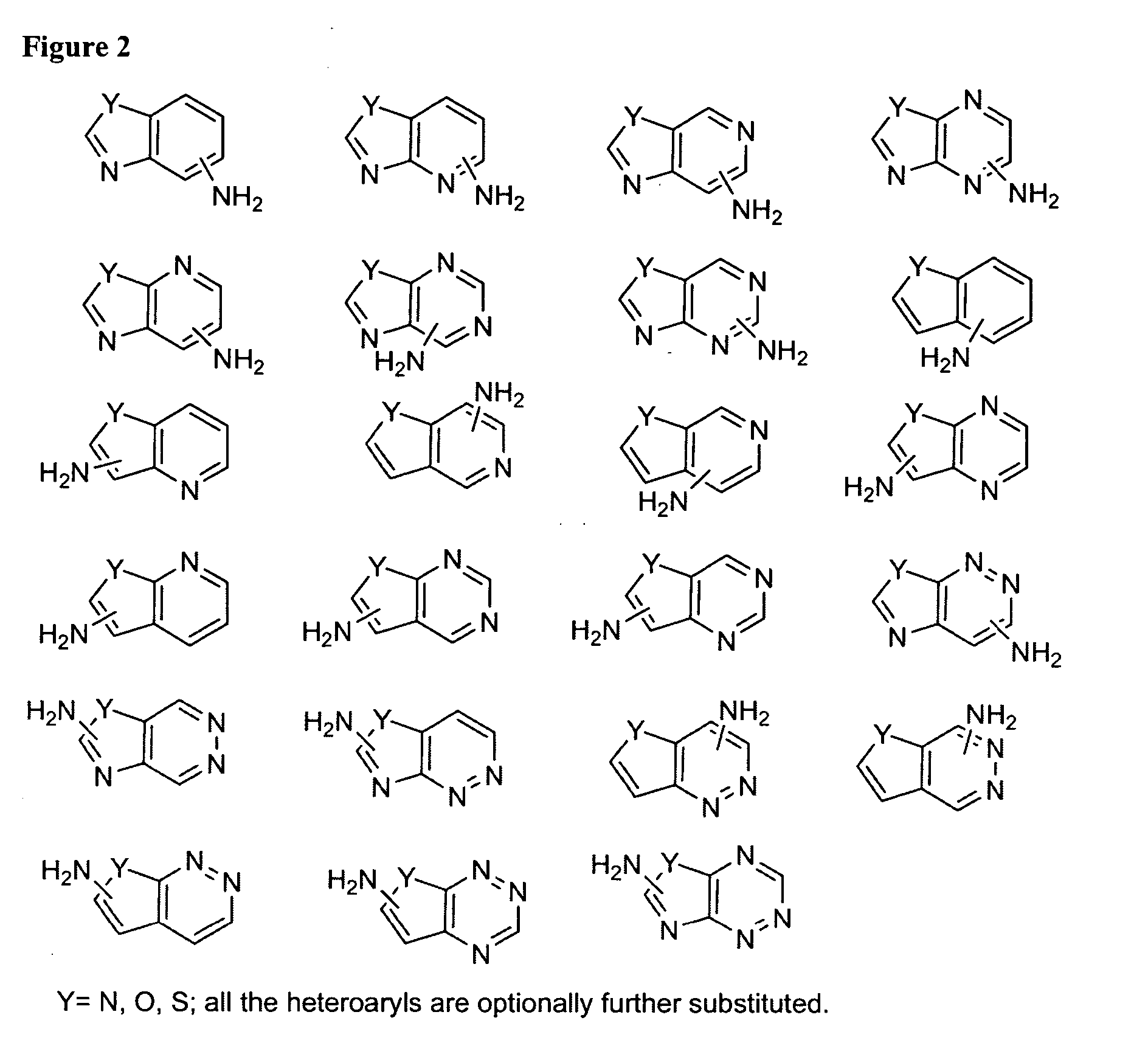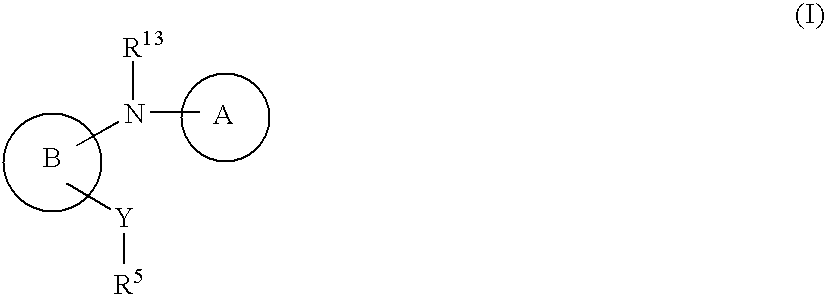Amino-benzazoles as P2Y1 receptor inhibitors
a technology of p2y1 receptor and aminobenzazole, which is applied in the field of aminobenzazoles, can solve the problems that the antagonists lack the necessary pharmacological properties for in vivo study
- Summary
- Abstract
- Description
- Claims
- Application Information
AI Technical Summary
Benefits of technology
Problems solved by technology
Method used
Image
Examples
example 1
[0324] To a solution of the mixture prepared in 1d in dichoroethane (2 mL) was added EDC (50 mg, 261 mmol) and the mixture was stirred overnight at rt. More EDC (20 mg, 104 mmol) was added to the reaction, and the mixture was stirred another 18 h at rt. The mixture was concentrated and purified by preparative HPLC (continuous gradient from 0% B to 100% B; A=90:10:0.1 H2O:MeOH:TFA; B=90:10:0.1 MeOH:H2O:TFA) to afford Example 1 (55 mg, 75% yield) as a pink powder. [M+H]+=373.5. 1H NMR (400 MHz, CD3OD) δ ppm 1.13 (s, 9H), 2.39 (s, 3H), 6.95 (dd, J=7.96, 1.39 Hz, 1H), 7.13 (m, 4H), 7.24 (m, 2H), 7.35 (dd, J=7.83, 1.52 Hz, 1H), 7.98 (dd, J=7.71, 1.64 Hz, 1H), 8.12 (dd, J=4.80, 1.77 Hz, 1H).
Example 2
(6-tert-Butyl-1H-benzoimidazol-2-yl)-[2-(2-tert-butyl-phenoxy)-6-methoxy-pyridin-3-yl]-amine
[0325]
2a
2-(2-tert-Butyl-phenoxy)-6-methoxy-3-nitro-pyridine
[0326] A solution of 2-chloro-6-methoxy-3-nitropyridine (5.20 g, 27.6 mmol) in DMF (50 mL) was treated with 2-tert-butylphenol (4.9 mL,...
example 2
[0333] To a solution of the mixture from 2d in dichoroethane (2 mL) was added EDC (23 mg, 0.12 mmol) and the mixture was stirred overnight at rt. The mixture was concentrated and purified by preparative HPLC (continuous gradient from 20% B to 100% B; A=90:10:0.1 H2O:MeOH:TFA; B=90:10:0.1 MeOH:H2O:TFA) to afford Example 2 (22 mg, 66% yield). [M+H]+=445.28.
Example 3
(6-tert-Butyl-1H-benzoimidazol-2-yl)-[2-(3-trifluoromethyl-phenoxy)-pyridin-3-yl]-amine
[0334]
3a
3-Nitro-2-(3-trifluoromethyl-phenoxy)-pyridine
[0335] A solution of 2-chloro-6-methoxy-3-nitropyridine (20 g, 125 mmol) in DMF (120 mL) was treated with 3-trifluoromethylphenol (21 g, 129 mmol) and cesium carbonate (50 g, 154 mmol). The mixture was heated at 70° C. for 14 h. The reaction was concentrated. The residue was dissolved in ethyl acetate and washed with brine, 5% lithium chloride, and aqueous HCl and brine. After concentration, purification was achieved by column chromatography on silica gel using a continuous gra...
example 3
[0342] To a solution of the mixture prepared in 3d in dichoroethane (2 mL) was added EDC (23 mg, 0.12 mmol) and the mixture was stirred overnight at rt. The mixture was concentrated and purified by preparative HPLC (continuous gradient from 20% B to 100% B; A=90:10:0.1 H2O:MeOH:TFA; B=90:10:0.1 MeOH:H2O:TFA) to afford Example 3 (14 mg, 21% yield). [M+H]+=427.15.
Example 4
[2-(2-tert-Butyl-phenoxy)-pyridin-3-yl]-(5-methyl-benzooxazol-2-yl)-amine
[0343]
4a
1-[2-(2-tert-Butyl-phenoxy)-pyridin-3-yl]-3-(2-hydroxy-5-methyl-phenyl)-thiourea
[0344] Compound 1c (20 mg, 0.07 mmol) and 2-amino-p-cresol (9 mg, 0.06 mmol) were mixed in DCE (1.0 mL) and stirred for 2 days at rt. The reaction mixture was concentrated. Half of the crude reaction mixture was used in the next step without further purification. The other half was purified by preparative HPLC (continuous gradient from 30% B to 100% B; A=90:10:0.1 H2O:MeOH:TFA; B=90:10:0.1 MeOH:H2O:TFA) to afford 12 mg (90%) of 4a. [M+H]+=408.39. 1H N...
PUM
| Property | Measurement | Unit |
|---|---|---|
| temperatures | aaaaa | aaaaa |
| temperatures | aaaaa | aaaaa |
| temperatures | aaaaa | aaaaa |
Abstract
Description
Claims
Application Information
 Login to View More
Login to View More - R&D
- Intellectual Property
- Life Sciences
- Materials
- Tech Scout
- Unparalleled Data Quality
- Higher Quality Content
- 60% Fewer Hallucinations
Browse by: Latest US Patents, China's latest patents, Technical Efficacy Thesaurus, Application Domain, Technology Topic, Popular Technical Reports.
© 2025 PatSnap. All rights reserved.Legal|Privacy policy|Modern Slavery Act Transparency Statement|Sitemap|About US| Contact US: help@patsnap.com



